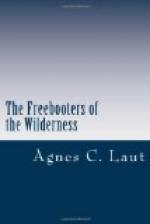“I don’t suppose, Dick, that right ever did triumph till somebody was willing to be crucified. Men die of vices every day; women snuff out like candles. What’s so heroic about a man more or less going down in a good game fight—?”
He felt the tremor in her voice and her hands, in her deep breathing; and his manhood came to rescue their balance in words that sounded foolish enough:
“So my old mountain talks to you, too? I’ll think of that when I’m up here in my hammock alone. Oh, you bet, I’ll think of that hard! What does the old mountain lady say to you, anyway? Look—when the light’s on that long precipice, you can sometimes see a snow slide come over the edge in a puff of spray. They are worst at mid-day when the heat sends ’em down; and they’re bigger on the back of the mountain where she shelves straight up and down—”
And her thought met his poise half way.
“What does the old mountain say? Don’t you know what science says—how the snow flakes fall to the same music of law as the snow slide, and it’s the snow flake makes the snow slide that sets the mountain free, the gentle, quiet, beautiful snow flake that sculptures the granite—”
“The gentle, quiet—beautiful thing,” slowly repeated the Ranger in a dream. “That sounds pretty good to me.”
He said no more; for he knew that the veil had lifted, and the voiceless voices of the night were shouting riotously. The wind came suffing through the swaying arms of the bearded waving hemlocks—Druid priests officiating at some age-old sacrament. Then a night-hawk swerved past with a hum of wings like the twang of a harp string.
“Look,” she said, poking at the sod with her foot. “All the little clover leaves have folded their wings to sleep.”
Old Calamity passed in and out of the Range cabin. Wayland couldn’t remember how from the first they had slipped into the habit of calling each other by Christian names. It was the old half-breed woman, who had first told him that the Canadian, Donald MacDonald, the rich sheep man, had a daughter travelling in Europe. One day when he had been signing grazing permits in the MacDonald ranch house, he had caught a glimpse of a piano, that had been packed up the mountains on mules, standing in an inner sitting room; and the walls were decorated with long-necked swan-necked Gibson girls and Watts’ photogravures and Turner color prints and naked Sorolla boys bathing in Spanish seas. That was the beginning. She had come in suddenly, introduced herself and shaken hands.
And now Wayland felt a dazed wonder how in the world they two in the course of half an hour—the first half hour they had ever been alone in their lives—had come to deciding “straddle or fight”; but that was the unusual thing about her. She got under surfaces; but, until to-night on the Holy Cross Mountain, he had been able to laugh at his own new sensations, to laugh even at an occasional sense of his tongue turning to dough in the roof of his mouth.




